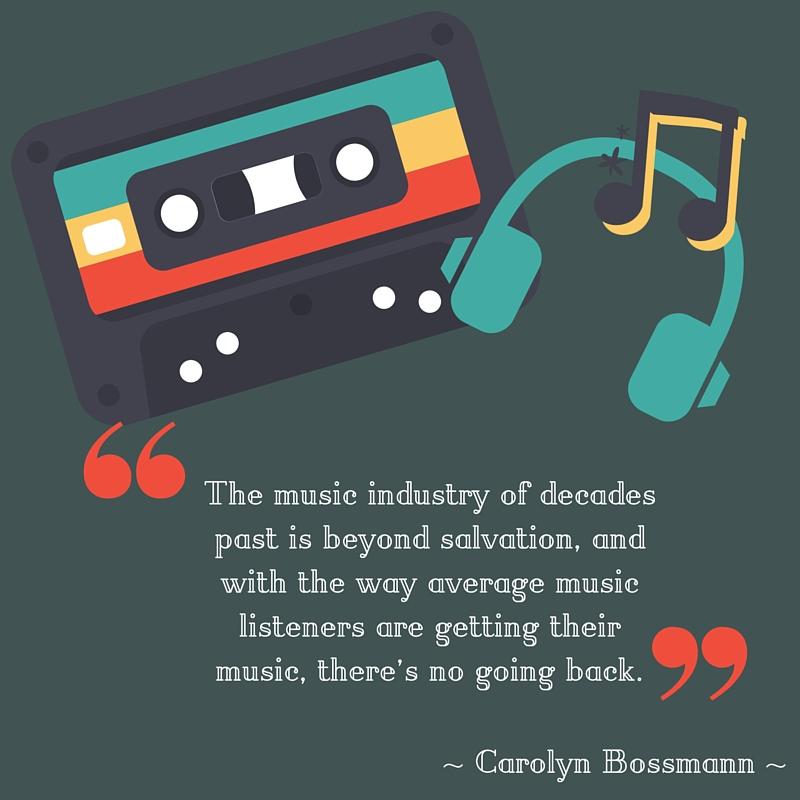By Carolyn Bossmann
Communications Director

“Hello,” the latest hit from British crooner Adele Laurie Blue Adkins, (aka Adele) premiered Oct. 22 and sold 1.1 million copies in the U.S. during its first week. It has already become a song that you can’t escape and don’t really want to.
With the huge success of the first single from her much-anticipated third album “25,” the first in three years, many critics say Adele is in place to save the struggling music industry. But the record companies don’t need a hero. The executives of these companies just need to realize they’re facing a new challenge: stepping away from the ’90s mentality of physical album sales. The industry has to learn to adapt to its consumers with today’s everchanging technological landscape.
More and more music listeners have turned to streaming services to listen to music, and some have taken to illegally downloading tunes. The music industry of decades past is beyond salvation, and with the way average music listeners are getting their music, there’s no going back.
When Adele’s sophomore album “21” was released in February 2011, the digital album sales were so high it almost seemed she could singlehandedly bring the music industry out of its funk. Some music writers have even dubbed the impact of her record sales the “Adele factor.”
“21” has sold more than 11 million copies in the U.S. alone, according to the Recording Industry Association of America. And the “Adele factor” is expected to continue with the release of her highly anticipated album “25.” The first single released, “Hello,” has hundreds of millions of views on YouTube and music industry critics have already begun hailing Adele as the savior of the music industry.
But not everyone is ready for the shift from CD shop to web browser. Taylor Swift took a stand against streaming services in 2014 by removing her music from Spotify, according to rollingstone.com.
“It’s my opinion that music should not be free, and my prediction is that individual artists and their labels will someday decide what an album’s price point is,” Swift wrote in an opinion piece for The Wall Street Journal about her concern for artists being paid fairly for their music. “I hope they don’t underestimate themselves or undervalue their art.”
The problem with her argument is her audience isn’t forced to buy her album to listen to her music, whether it is on Spotify or not. In this day and age, where electronic media is shared and uploaded on the Internet thousands of times a day, it’s hard for an artist with as large a pop culture impact as Swift to avoid having her music being downloaded or streamed for free. But Swift is right about one thing: streaming services like Spotify hardly compensate musicians.
There’s a breakdown of how artists are paid, depending on where they sell their music, whether they tour, what merchandise they sell, what products they endorse, and the list goes on.
However, musicians don’t really profit from streaming services. Most artists make their money from tours. “Rights holders generally make between $0.006 and $0.0084 per stream,” according to buzzfeed. com. That total amount is divided among the record companies and then finally trickles down to the artists themselves.
Swift is fighting a losing battle, and Adele has somehow found herself in the middle of it. It’s highly doubtful music sales will ever have any kind of significant rise because consumers have discovered ways to get all the music they want without paying a dollar.
Streaming services provide an extensive song selection and cheap prices, and they often also have basic plans that are free. If listeners decide they don’t want to go that route, there are ridiculous amounts of ways for them to get their music, legally, or otherwise.
Adele won’t save the music industry because it doesn’t need to be saved. It’s changing as far as how music listeners use different platforms to get the music they want. What Adele is doing is helping the music industry adapt from the way they have always done things to a new way of doing them.
Adele sells a lot of albums, but she also knows how to make great music videos that bring listeners to YouTube instead of just to iTunes. Her YouTube video for “Hello” was the first music video to be shot completely with IMAX cameras, according to variety.com.
Music artists and the music industry aren’t going anywhere. Instead of thinking of the music industry as the Titanic, think of it as a pair of those sneaker/roller skate shoes, Heelys. Heelys are adaptable to both walking and wheeling around. Going from walking to skating can be difficult, but once you get the hang of it, it’s second nature.






